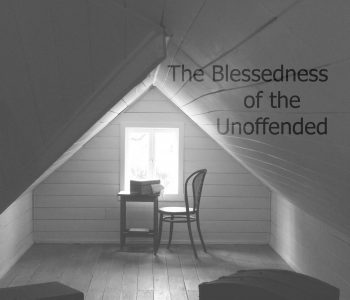 Other Authors
Other Authors
The Comforter
Reading: John 14:15-26; 15:17-26.
If we never need comfort there must be something wrong, for it was just because the disciples were about to enter a new stage of spiritual growth that the promise of the Comforter was given to them.
There are many helpful and suggestive renderings of the word “Paraclete”, but probably the name “Comforter”, in its full content, best serves our purpose to describe a very important aspect of the Spirit’s ministry. Chapters 14, 15 and 16 of John’s Gospel set forth something of the cost of discipleship, and it is in these three chapters that the Comforter is promised. To increase in the true knowledge of Christ, faithfully pursuing the full will of God, is a painful and costly path. The Lord made no secret of this, but rather sought to emphasise it to His disciples, who perhaps were inclined not to count the cost. There is a cost; but, thank God, there is one Who will stand by us as a true friend, encouraging and upholding; never forsaking; always understanding; holding us steady and steadfast to the end. This is the Comforter.
“Another Comforter”
The first statement tells us that He is “another” Comforter; that is to say, not different but similar, a further one in number, but just the same in kind. There had been one – and how much they owed to Him – there would now be another, just like the first. All that Christ had been to the disciples in His ministry of gracious helpfulness, the Spirit would now be the same.
Surely the secret of the disciples’ perseverance lay in the presence of their Lord with them. If, at the end of three years, they were still continuing in the way of discipleship, it was because He had been their stay and encouragement through all difficulties and trials. He had never glossed over their faults, but He had borne with them. Through thick and thin, failure and success, at all times and through all their varying moods, He, and He alone, had been the factor that maintained and preserved them: but for Him they would have despaired and abandoned all. So, by His ministry of consolation and encouragement, He had been their Comforter. The Spirit is just such a Comforter. He has other offices and activities in the saints, but accompanying all His other workings is this strong ministration of understanding love.
Other Comforters
There are “other comforters” of a very different order. Job suffered at their hands. They were well-meaning men who said some very true things, but they had a most unhelpful influence upon Job, and almost drove him to distraction. They did not deliberately seek to turn him away from the Lord; on the contrary they were concerned for his spiritual good. They failed him, however, in his time of deepest need, and so wounded his spirit that at last he cried out in desperation, “Have pity upon me, O ye my friends”. Miserable comforters they were indeed. And why was this? Because they sought to probe into the reasons for God’s dealings with His servant; they tried to explain Job’s faults, to uncover his secret sins, and to put him right. God alone can do that; and indeed He was putting him through a refining process for that very purpose. If those who loved Job desired to be his comforters, their wisdom would have been in giving him sympathetic encouragement, and not destructive criticism. When God’s children are in the fires they need the devoted and uncritical sympathy of love, the quiet encouragement to hold on and not to faint. Too often we are swift to judge, and to give advice; we seem to see so clearly what is the cause of the trouble, and where the one in question needs to be put right: and so, like Job’s would-be comforters, we lamentably fail to help our friend in distress. How precious is the friendship of the one who draws no hasty conclusions, asks no questions, offers no advice, but comes alongside in silent comradeship to stand by until the sufferer has come safely through. He is a true comforter. God could deal with Job: what Job needed was somebody to sustain and encourage him while he was in the Divine crucible. Such a one is the Comforter – the very antithesis of Job’s “comforters”.
In the Person of the Holy Spirit we have the two offices of Refiner and Comforter combined. On the one hand He leads us into the purifying fires for our sanctification; on the other He stands by us, as the faithful friend, to see us safely through. He it is who chastens us, sometimes in hard ways, but it is also He who has covenanted to stand by us and with us in understanding sympathy and love. Oh, do let us believe it, and do let us count on His gracious ministrations as Comforter, reckoning on His assurance that until we are safely through we shall always find Him at our side. At all times we may count on Him.
Why the Comforter is Needed
(a) A New Aloneness
Why did the Lord Jesus so emphasise the provision of the Comforter? Why were the disciples so likely to need Him? The answer to these questions is to be found in the chapters under consideration.
Firstly, it was because they were about to lose the manifest and visible presence of Christ. He was to leave them; an experience that, but for the Comforter, would make them desolate. That is both a historical fact and a spiritual principle. This marked a new stage in the spiritual progress of the disciples, a transition from being with Christ to having Christ in them. It sounds very glorious; in experience, however, it can be most painful, for it is like losing the Lord. From one point of view, in the matter of outward manifestations, He seems to have gone away: so far as consciousness to the senses is concerned you have lost your Lord. They did! Until now life had been very simple, for the Lord was ever with them. They could always turn to Him. Deliverance, guidance, provision, instruction; all these and much more were theirs constantly because He walked with them. How easy life had been while Christ was with them! No wonder their hearts were filled with sorrow and dismay at the prospect of His going away.
Yet Christ did leave them, and then they needed the Comforter. They had been children, and as such had been cared for by Christ. The time had now arrived for them to put away childish things and grow up into men; an experience which always involves a certain aloneness. The reliance must not now be on external things. We all know something of the early stages of the Christian life, when we are so blessedly conscious of the nearness of the Lord. He is manifestly with us; we sense His nearness, and find tokens of it at every step of the way. Wonders are constantly happening; prayers are immediately and gloriously answered; needs are met in miraculous ways, and life is one long romance of the glorious acts of God on our behalf.
As we grow up spiritually, there must needs be some withdrawal of these constant outward helps to holiness. The little child is watched over and protected, but the grown son ought to have something of the parental wisdom and power within him. It is this transition from the outward tokens of the Lord’s being with us to the heart-knowledge of His presence within which is painful. Apart from the Comforter, it would bring desolation to the heart. Inevitably spiritual growth involves the loss of those more elementary, though so precious, manifestations of the favour of the Lord. Perhaps your prayers are not so quickly answered, and you are forced to pray on in faith. There was a time when the Lord seemed to be doing so much through you, but now you are only conscious of the little that you do, and of how seldom you see the fruit of your labours. There are perplexing trials in your life which the Lord will not remove, circumstances which He does not change. You no longer have those thrilling experiences of daily needs being met by a succession of wonders. What has happened? Has the Lord left you? Yes, in that outward way of manifesting His presence to the senses, He has. Christ does not always want to be with His disciples, treating them like children. He wants them to have a new knowledge of Himself which is not outward but inward, not circumstantial but spiritual. “It is expedient for you that I go away”. That is the price of spiritual progress, and it is such a costly one that we cannot bear it without deeper intimacy with the Comforter. We need Him: and we have Him! He is ever near, to keep us steady and to carry us through.
(b) A New Antagonism
In chapter 15 the words, “But when the Comforter is come…” are preceded by a passage which speaks much of hatred and persecution. This evidently was to be a new experience for the disciples. Until now men had hated their Lord, but had largely despised or ignored His disciples. The persecution had all been directed against the Person of Christ; the disciples knowing but little of men’s enmity, and still less of the enmity of Satan. The Lord Jesus seems to have protected and sheltered His disciples, shielding them so that they were not exposed to the onslaughts of hell. They could not have borne it. When about to leave them, however, He warned them of a new experience of antagonism that would be theirs. That is the price of spiritual sonship.
There is a Christian experience of infancy in which little or nothing is known of spiritual conflict. That is not meant to be unduly prolonged. There is little in the Gospels to suggest that the disciples had a bad time either from the world or the Devil in those days. Then Christ left them, and they were exposed, as we read in the Acts, to a tremendous onslaught of spiritual enmity. All hell was moved against them. As they very soon recognised, the nations who were confederate in one united attack upon the Christ of God now maintained and pressed home that attack upon His people. That, again, is the cost of sonship. Of this the disciples were duly warned in John 15:18-25. But happily at the end of the passage the Saviour continued, “But… the Comforter.” There is another side, thank God! Persecution and hatred – but the Comforter!
If you do not know spiritual antagonism you are missing the full blessings of the Comforter. You may be evading the cost, but you are also missing the joy. The Comforter is not given merely to bring a quiet, soothing influence; He comes to give succour and strength to those who are in the front line, bearing the brunt of Satan’s attack. It is true that pressing on in the spiritual life brings increasing hatred and persecution, but it is equally true that the Comforter is given in fulness to make it abundantly worth while. The more the persecution, the greater the consolation (2 Cor. 1:5).
In 2 Kings 11 we are told of the slaughter of the seed royal, excepting little Joash, who was rescued by his aunt, with whom he was hid in the house of the Lord for six years. He was sheltered in safety for that period because of his tender years. But it was a tragic time, for Athaliah reigned. Evil was on the throne because the lawful ruler was too tender to be exposed. At the end of the six years the priest decided that the boy could be hidden no longer. It was necessary that they should take the risk of manifesting him. He was brought out of hiding; an action which brought the strongest indignation of Athaliah against him; but his exposure soon compassed her end. Is this not a parable? God’s people can be hidden, like the child in the temple; they can be shielded from the Adversary, but meanwhile evil will be on the throne. How will the Lord overthrow evil, and dethrone Satan? By bringing His people out into the open, and allowing the Devil’s hatred to be concentrated upon them. He is the King, but we are called to reign with Him. He is also the Priest who calls us to face the foe. Christ told His disciples that He was deliberately leaving them in a hostile world which is the Devil’s domain, not that they should be swallowed up, but that Satan might be defeated. In this way is the kingdom of darkness overthrown, when it is drawn out in bitter hatred of the children of God to its own undoing.
Here again we are reminded of the costliness of discipleship. It is so great that some have deemed it a mistaken course to pursue. They wrongly argue that it is better to continue in the simple life of childlike happiness than to plunge into a grim and bitter warfare. How, then, is the Kingdom to come and evil be dethroned, if not by the Church’s fellowship with Christ ? Nevertheless we are wrong if the spiritual conflict makes us dour and strained, for the Comforter is especially present with those who face antagonism for Christ’s sake. The hatred with which Christ was hated comes upon them; but the Comforter from Christ sustains them.
(c) A New Refining
The third reason why the disciples needed to know the Comforter was because the Spirit of Truth was coming to work in them. Of course it is the same Person, for the Comforter is the Spirit of Truth. It is a hard enough experience to lose the manifest consciousness of Christ’s presence: it is harder still to face the enemies’ hatred; but the bitterest experience of all is to know conviction by the Spirit of Truth. To know the truth about ourselves, our secret motives and our unsuspected selfishness, is a crushing revelation that we can hardly endure. The Lord Jesus said to His disciples, “I have yet many things to say unto you, but ye cannot bear them now” (John 16:12). If He told us everything about ourselves that needs putting right we certainly could not bear it. But the truth must be known sooner or later: so Christ proceeded to explain that they would be refined as they were able to bear it, by the Spirit leading them into all the truth. That is God’s goal for us all; to lead us out of the unreality or deception that is in ourselves, out of the contradiction that we are, into the true, pure, spiritual reality that is in Christ. Such a transition is likely to be painful in the extreme. To be thus in the hands of the Spirit of Truth is indeed to need a Comforter. Thank God, He is given for that very purpose!
While He comforts and strengthens, His work as the Spirit of Truth is to apply the knife of the Cross to our flesh. We may, however, refuse that knife, standing our ground and rejecting His conviction as to the truth about our hearts. If we do so, we shall miss the joys of the Comforter. Let us suppose, for example, we have some strong opinions which we hold. The Spirit may seek to cut them away from us, and to weaken our self assurance. Perhaps we are not prepared to allow Him to do so. We may argue and maintain our point. We may become the more convinced by our arguments: convinced – but not comforted! We may propagate our opinions, seeking to convince others that we are right and they are wrong. They may or may not be convinced, but they will certainly not be comforted. Even if we are right, the Spirit is against what is held in the strength of carnal reasoning or determination. If we just let the whole matter go to the Lord, and cease to insist on our correctness, we may feel weak and foolish, but we shall have an altogether new knowledge of the Comforter.
This refining process will go on all through our lives. The Spirit will order our circumstances in such a way as to bring out what lies latent within. We do not realise how much unsuspected flesh lurks in us until some new experience brings it to the surface. Do not let us blame other people or conditions, but recognise that only what was already within can come out of us. It is the Spirit’s work to bring it to light. If we resent His convictions and seek to justify ourselves, we shall forfeit the spiritual profit and also miss the Comforter. If, however, we humble ourselves before God, confessing our shame and disappointment with ourselves, the Comforter will bring us strong and precious consolation. We are usually the last to recognise our own faults. Others see them long before we do. The Lord knew them from the beginning, but awaits His own time and our readiness before convicting us. We must not resist His strivings and seek to justify ourselves, but open our hearts in humble confession.
This is spiritual progress. It appears to be the very reverse, and tempts us to fear that we are getting worse. That is not true, for the price of pressing on into fulness is disillusionment about self, bitter sorrow and distress while the Spirit applies the Cross. Happy the man who, while passing through such an ordeal, has a trustworthy friend who will quietly minister sympathy and strength to his heart! Whether we have such a human friend or not, we have the Comforter. He is Christ’s promised gift. “I will send”: “Whom the Father will send”. Let faith reckon on Him and appropriate Him in every time of need. He is ours. However great may be the cost of pressing on unto the fulness of Christ, it is more than outweighed by the abiding, understanding, loving presence of the Comforter.
Published in “A Witness and A Testimony” magazine, 1942.



















